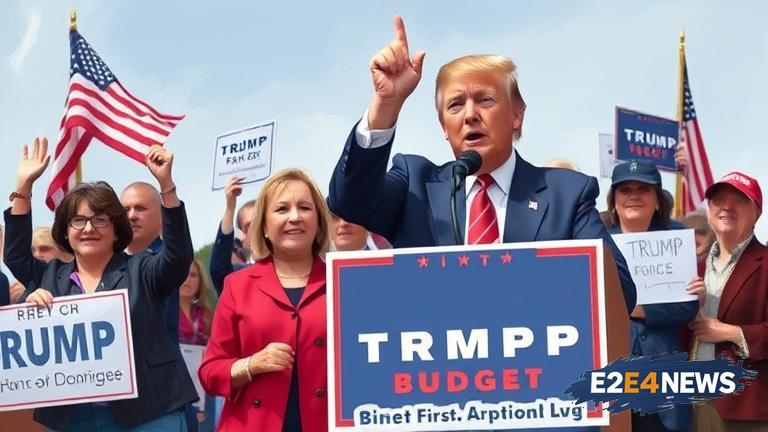A recent rally, dubbed ‘Families First,’ has brought attention to the proposed Trump budget bill, which has been met with widespread criticism from various groups. The protesters, comprising families, individuals, and community leaders, converged to express their discontent with the suggested cuts to social welfare programs. The rally highlighted the potential consequences of the budget bill, including reduced funding for essential services such as healthcare, education, and food assistance. Many attendees argued that the proposed cuts would disproportionately affect vulnerable populations, including low-income families, children, and the elderly. The Trump administration has defended the budget bill, citing the need to reduce the national debt and promote economic growth. However, opponents claim that the bill prioritizes tax cuts for the wealthy and large corporations over the needs of ordinary citizens. The Families First rally has sparked a national conversation about the role of government in supporting social welfare programs and the impact of budget decisions on local communities. As the debate continues, lawmakers are faced with the challenge of balancing competing interests and finding a solution that addresses the concerns of all stakeholders. The proposed budget bill has also raised questions about the effectiveness of current social welfare programs and the need for reform. Some experts argue that the programs are inefficient and wasteful, while others claim that they provide a vital safety net for those in need. The Families First rally has demonstrated the passion and dedication of those who believe that social welfare programs are essential to the well-being of society. The event has also highlighted the importance of civic engagement and the need for citizens to participate in the democratic process. As the budget bill moves forward, it is likely that the debate will intensify, with both supporters and opponents of the bill voicing their concerns. The outcome of the budget bill will have far-reaching consequences for the country, and it is essential that lawmakers consider the potential impact on all segments of society. The Families First rally has shown that there is a strong desire for a more compassionate and equitable approach to budgeting, one that prioritizes the needs of families and individuals over special interests. The rally has also underscored the importance of community-led initiatives and grassroots activism in shaping policy decisions. Furthermore, the event has demonstrated the power of social media in mobilizing support and raising awareness about critical issues. The Trump administration’s budget bill has been criticized for its lack of transparency and accountability, with many arguing that the proposed cuts are based on flawed assumptions and ideology rather than evidence-based policy. The Families First rally has called attention to the need for a more nuanced and informed approach to budgeting, one that takes into account the complexities and challenges faced by local communities. Ultimately, the outcome of the budget bill will depend on the ability of lawmakers to find common ground and work towards a solution that benefits all Americans. The Families First rally has sent a clear message that the needs of families and individuals must be prioritized in the budgeting process, and that a more compassionate and equitable approach is essential for building a stronger and more just society. The rally has also highlighted the importance of ongoing activism and advocacy, as the fight for social welfare programs and government accountability is likely to continue in the months and years to come. In conclusion, the Families First rally has sparked a critical conversation about the role of government in supporting social welfare programs and the impact of budget decisions on local communities. As the debate continues, it is essential that lawmakers consider the potential consequences of the proposed budget bill and work towards a solution that prioritizes the needs of families and individuals.
